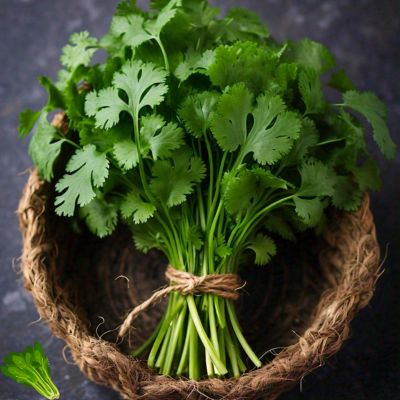Coriander is a fragrant herb packed with antioxidants, known for its versatility in cooking and its various health benefits. Whether added to a hearty curry or a fresh salsa, coriander-derived from the Coriandrum sativum plant-brings more to the table than flavor. Known also as cilantro (for its leaves) in the United States and as Chinese parsley in some regions, coriander is rich in nutrients that benefit the body in multiple ways, from balancing blood sugar levels to promoting digestive health. Let’s explore eight key health advantages of coriander.

Health Benefits
Helps Lower Blood Sugar
One of coriander’s most notable benefits is its ability to help regulate blood sugar levels, which is crucial for people at risk of type 2 diabetes. Studies in animals suggest that coriander seeds, as well as their extracts and oils, may help lower blood sugar by enhancing the body’s enzyme activity to process sugar efficiently. In one study, rats with obesity and high blood sugar experienced a 4 mmol/L reduction in blood sugar within six hours of taking coriander extract-a similar effect to that of diabetes medications. Given its potency, coriander should be used cautiously by those with low blood sugar or diabetes.
Packed with Immune-Boosting Antioxidants
Rich in antioxidants, coriander contains compounds that shield cells from damage by free radicals. These antioxidants-such as terpinene, quercetin and tocopherols-are known to combat inflammation and may even have anti-cancer, immune-boosting and neuroprotective properties. Research on animal and test-tube studies has shown that the antioxidants in coriander can slow down the growth of cancer cells and reduce inflammation, adding further value to coriander’s health profile.
Supports Heart Health
Studies suggest that coriander may reduce risk factors associated with heart disease, such as high blood pressure and elevated levels of LDL (bad) cholesterol. As a diuretic, coriander aids in flushing excess sodium and water, potentially lowering blood pressure. Additionally, research in rats showed that coriander seeds could significantly decrease LDL cholesterol while increasing HDL (good) cholesterol. Cultures with diets rich in spices like coriander also tend to have lower rates of heart disease, perhaps due to lower sodium consumption and higher antioxidant intake.
Protects Brain Health
Coriander’s anti-inflammatory properties extend to brain health, which may help protect against age-related diseases like Alzheimer’s, Parkinson’s and multiple sclerosis. Research in rats found that coriander extract could protect nerve cells from damage, potentially aiding in the management of seizure-induced injuries. In addition, a study in mice suggested that coriander leaves could enhance memory, making it a potential dietary consideration for those concerned about cognitive decline.
Aids Digestion and Gut Health
Coriander has been used for centuries for digestion. Its essential oils, derived from the seeds, can aid in digestion and ease discomfort associated with irritable bowel syndrome (IBS). In an eight-week study involving 32 people with IBS, a herbal medication containing coriander significantly reduced symptoms like bloating and stomach pain compared to a placebo. Traditional medicine also uses coriander as an appetite stimulant and studies in animals indicate it could enhance appetite in individuals with reduced eating interest.
Fights Infections
Coriander’s antimicrobial properties make it effective against certain infections and foodborne illnesses. Dodecenal, a compound in coriander, has been found to combat Salmonella bacteria, which is responsible for a significant number of food poisoning cases each year. Research also indicates that coriander seeds may be effective against bacteria that cause urinary tract infections (UTIs), making coriander a potentially useful ingredient for preventing and fighting bacterial infections.
Supports Skin Health
Coriander is increasingly recognized for its skin benefits, including its potential to prevent mild skin irritations such as dermatitis. While one study indicated that coriander extract alone might not be effective for severe cases of diaper rash, it could be beneficial when combined with other soothing compounds. The antioxidants in coriander can also help prevent skin aging and protect against UVB damage. Some people even use coriander juice topically to manage acne, pigmentation and dryness, though more research is needed in this area.
Easy to Incorporate into Your Diet
One of coriander’s best attributes is how easy it is to include in meals. The seeds and leaves have distinct flavors that complement various types of dishes. Coriander seeds, which have an earthy, slightly spicy flavor, are often used in baked goods, pickled vegetables and savory dishes like curries. Meanwhile, the leaves-known as cilantro in the U.S.-have a refreshing, citrusy taste that enhances soups, salads and salsas. You can also blend cilantro with ingredients like garlic, peanuts and lemon juice to make a flavorful paste for marinades, dips and sauces.
Conclusion
Coriander is more than just a flavorful herb; it’s a powerful addition to a health-conscious diet. From its ability to regulate blood sugar and reduce inflammation to its heart-healthy, antimicrobial and skin-protecting properties, coriander offers an array of benefits for the body. Integrating coriander seeds or cilantro leaves into your meals is an easy way to enhance both flavor and health. Whether you prefer it fresh in salads or ground in curries, this herb can be a valuable component in supporting overall wellness.
[Read more : Transform Your Life: Unlock the Secrets of the Body Reset Diet Today!]
**********************
Frequently Asked Questions
Q1. What is coriander?
Answer : Coriander is a herb widely used in cooking for its fresh, citrusy flavor. It includes both the leaves (often called cilantro) and seeds, which have a warm, nutty taste.
Q2. How can coriander be used in cooking?
Answer : Fresh coriander leaves add flavor to salads, curries and soups, while coriander seeds are used in spice blends, marinades and baked goods.
Q3. What are the health benefits of coriander?
Answer : Coriander is rich in antioxidants, vitamins A, C and K and can aid digestion, improve skin health and support heart health.
Q4. Does coriander help with digestion?
Answer : Yes, coriander has compounds that may stimulate digestive enzymes, helping with issues like bloating and indigestion.
Q5. Is coriander good for heart health?
Answer : Coriander may help lower blood pressure and cholesterol levels, supporting cardiovascular health.
Q6. Can coriander aid in weight loss?
Answer : Coriander can support weight loss by boosting metabolism, aiding digestion and acting as a mild diuretic.
Q7. Does coriander have anti-inflammatory properties?
Answer : Yes, coriander contains antioxidants and compounds that may reduce inflammation and fight harmful free radicals.
Q8. Is coriander safe to eat raw?
Answer : Yes, coriander is safe and commonly eaten raw in salads and as a garnish. Just wash it well to remove any pesticides.
Q9. Can coriander help control blood sugar?
Answer : Some studies suggest that coriander may help lower blood sugar levels by enhancing insulin activity, beneficial for people with diabetes.
Q10. Are there any side effects of coriander?
Answer : Coriander is generally safe, but some people may have allergies or experience mild reactions like stomach discomfort if consumed in large amounts.

1 thought on “Health Benefits of Coriander You Need to Know”